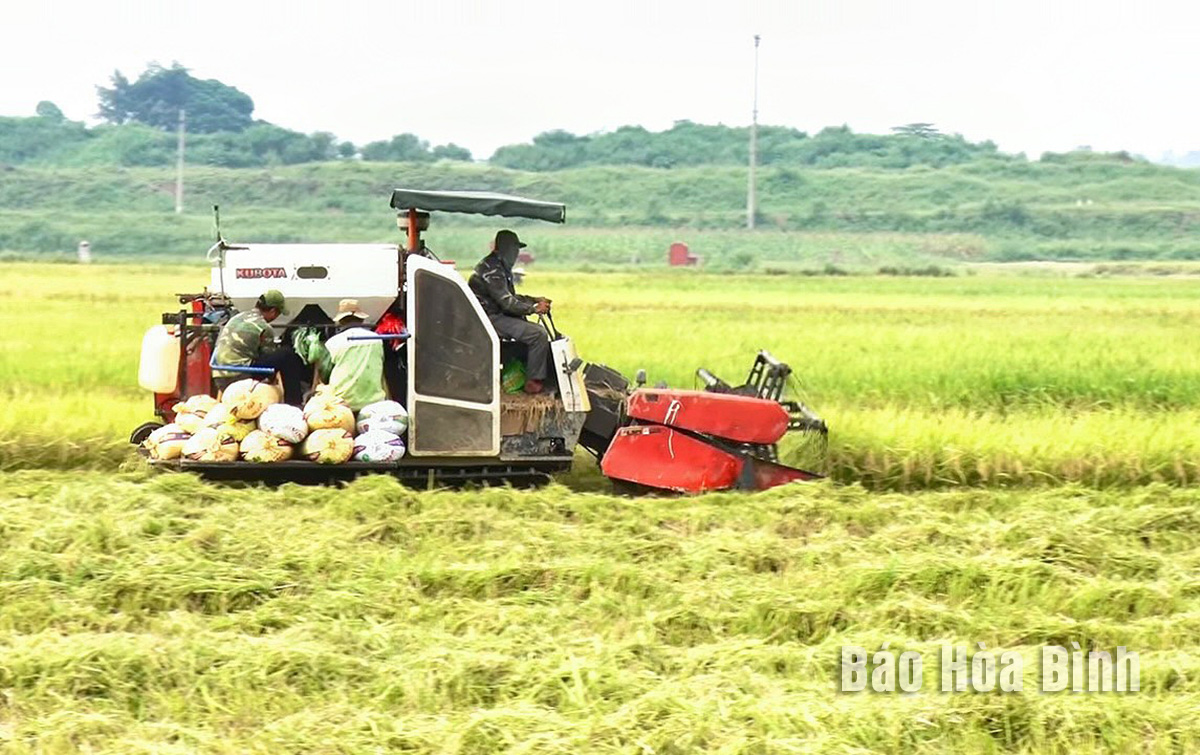
Severe weather conditions on the last days of May has affected agricultural production in Hoa Binh province. In order to minimise the impact of extreme weather on rice yields, local farmers have mobilised human resources to harvest ripe paddy.
Farmers in Thong Nhat commune, Lac Thuy district, harvest paddy in the field.
According to Lac Thuy district’s Division of Agriculture and Rural Development, as of the end of May 2024, the district has harvested over 1,200 hectares of paddy, reaching over 76% of the plan. The total production of food grains reached nearly 15,800 tonnes.
Along with Lac Thuy, districts and Hoa Binh city are accelerating the progress of harvesting. So far, the province has harvested over 3,990 hectares of the spring paddy crop.
In the spring crop of 2024, the province has cultivated nearly 16,000 hectares of paddy, 15,500 hectares of corn, nearly 1,300 hectares of sweet potatoes, 6,300 hectares of vegetables and beans of all kinds. Districts and Hoa Binh city have directed specialised divisions to closely work with farmers to accelerate the harvest of the spring paddy crop.
In order to minimise damage due to unfavorable weather conditions for crops, the provincial Department of Agriculture and Rural Development has issued a document directing the production of winter-spring crops in 2023 - 2024 and implementing the production plan for summer-autumn crops and crops in 2024.
Accordingly, for the areas of spring paddy being harvested, localities should allocate maximum human resources and machines to urgently harvest quickly and compactly, avoiding damage due to rains accompanied by whirlwinds. On the harvested areas, plow cages are deployed to bury the residues early, combined with the treatment of biological products to quickly decompose the residues, limit organic poisoning and pests and diseases in the next crop.
For rice production in the 2024 season, localities have been asked to give priority to varieties with short growing time, high yield and decent quality. Each locality should choose from 2-3 main paddy varieties and cultivate centrally by area to facilitate the care and control of pests and diseases.
The Standing Board of the Hoa Binh provincial Party Committee has agreed in principle on a proposal by the Standing Board of the Party Committee of Hoa Binh city to gather feedback on the city’s 1:2000 zoning plan, which forms part of its broader urban development strategy.
Hoa Binh province has made notable progress in public administration reform and digital government development, with the satisfaction index among citizens and businesses reaching over 84%, according to recent government evaluations.
Thanks to great efforts by local authorities in recent times, the governance and public administration performance of Mai Chau district has been significantly improved.
In the afternoon of June 6, the Party Committee, the People's Council, the People's Committee and the Fatherland Front of Lac Son district solemnly held a meeting to celebrate the 139th anniversary of the district's founding (1886–2025) and the 79th anniversary of the establishment of the district's Party Committee (1946–2025). There was the attendance of Mr. Bui Van Thang, the Vice Chairman of the Provincial People's Council; Mr. Quach Tat Liem, the Vice Chairman of the Provincial People's Committee; Ms. Dang Bich Ngoc, the Deputy Head of the National Assembly Delegation of the province; as well as the former leaders of the province and district through various periods, who are the natives of the district.
Implementing the Politburo’s Resolution No. 57-NQ/TW on breakthroughs in science – technology, innovation, and digital transformation is a golden opportunity for the northern mountainous province of Hoa Binh to renew growth model, improve competitive edge and shorten digital gap.
Resolution 57-NQ/TW, issued by the Politburo on December 22, 2024, identifies sci-tech, innovation, and digital transformation as strategic breakthroughs to build a developed and prosperous nation. In Hoa Binh province, this spirit is not just a slogan, it’s being put into action through concrete initiatives that form a "new development triangle”: digital citizenship, digital economy, and digital administration.



